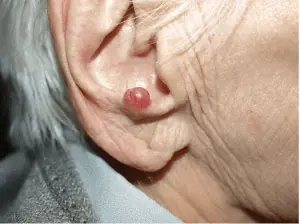Merkel Cell Carcinoma
Call (877) 900-3223
MERKEL CELL CARCINOMA

What Is Merkel Cell Carcinoma?
Merkel Cell Carcinoma Symptoms
Who Gets Merkel Cell Carcinoma?
Merkel Cell Carcinoma Treatment
Merkel Cell Carcinoma Prognosis
Merkel Cell Carcinoma Prevention
What Is Merkel Cell Carcinoma?
Merkel cell carcinoma (MCC) is a rare and aggressive type of skin cancer. It occurs when Merkel cells, which are found in the epidermis (the top layer of skin), grow out of control. The cancer can spread rapidly to the surrounding tissues, nearby lymph nodes and distant parts of the body.
Merkel Cell Carcinoma Symptoms
MCC typically appears as a single, firm bump that is shiny and usually painless. It may be skin-colored, red, blueish-red or purple. It might bleed if it’s been scraped or nicked.
These tumors can develop anywhere on the body, but they most often appear on areas exposed to sunlight, such as the face, neck and arms. They tend to enlarge quickly over weeks and months.
Who Gets Merkel Cell Carcinoma?
MCC does not appear to run in families. Certain risk factors are thought to increase the likelihood of developing it, including:
- Being over the age of 50, Caucasian and male
- Having a history of heavy sunlight exposure or tanning bed use
- Having had photodynamic therapy for a condition such as psoriasis or vitiligo
- Having a history of other types of cancer
- Having a weakened immune system, either from a condition such as HIV or from taking medication that suppress the immune system
The cause of MCC is not known. In about 8 out of 10 cases, a very common virus that lives on the skin, called Merkel cell polyomavirus, is present. Experts aren’t sure how or whether it contributes to the development of MCC.
Merkel Cell Carcinoma Treatment
The tumor is usually removed via surgery. However, because MCC has a high risk of recurring, most patients will receive additional treatment to prevent it from returning.
During surgery, the doctor will excise (cut out) the tumor and remove some healthy surrounding tissue as well. He or she may opt to do this using a procedure called Mohs surgery, in which a single layer of tissue is removed at a time. The tissue is analyzed to determine whether it’s cancerous, and if it is, the doctor repeats this process until no cancer cells are detected.
Prior to surgery, the doctor will likely perform a sentinel node biopsy to determine whether the cancer has reached nearby lymph nodes. If it has, the surgeon may remove the lymph nodes during surgery.
Radiation therapy may be given after surgery to kill any cancer cells that may remain. It is also sometimes used to treat affected lymph nodes.
If the patient isn’t healthy enough for surgery or if the tumor’s location makes it difficult or impossible to fully remove, radiation therapy may be used instead.
If MCC has spread to other parts of the body, radiation therapy may be advised, sometimes along with other treatments, to shrink the tumors or slow their growth and/or to reduce symptoms. Another option is immunotherapy, which involves giving medications intravenously (by IV) to help the body’s immune system recognize and destroy the cancer cells.
Chemotherapy is typically used only in people who haven’t responded to other treatments or are in the later stages of the disease. That’s because MCC often becomes resistant to chemotherapy drugs.
Merkel Cell Carcinoma Prognosis
Every case of cancer is different. Survival rates for MCC depend in part on where it started, how it responds to treatment and whether it has spread to nearby areas, to distant body parts or not at all. The cancer can be fatal, but more than 75% of people whose MCC has not spread are alive five years after diagnosis.
New treatments are being tested in clinical trials.
Merkel Cell Carcinoma Prevention
You can reduce your risk of MCC and other skin cancers by following these tips:
- Limit sun exposure. This is particularly important when sunlight is strongest, usually between 10am and 4pm.
- Wear sunscreen every day. Choose a broad-spectrum, water-resistant sunscreen with SPF 30 or higher and apply it generously at least every two hours.
- Cover up outdoors. Wear sunglasses, a wide-brimmed hat, long pants and a lightweight long-sleeved top if possible.
- Avoid artificial sunlight. Tanning beds and lamps are just as harmful to your skin as the sun.
- Perform skin checks. Report any bump, freckle or mole that changes in size, color or shape to your doctor ASAP.
- Schedule skin cancer screenings, especially if you’ve had any type of skin cancer in the past.





